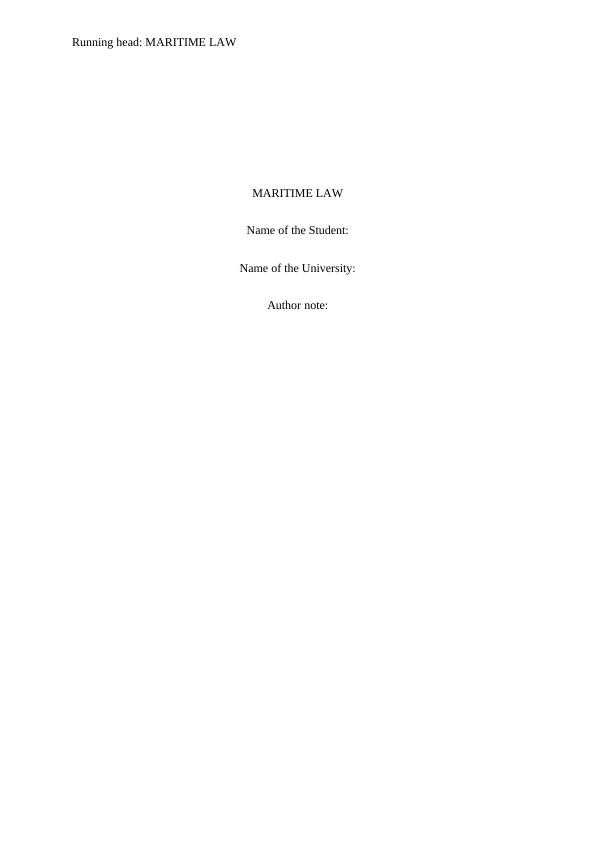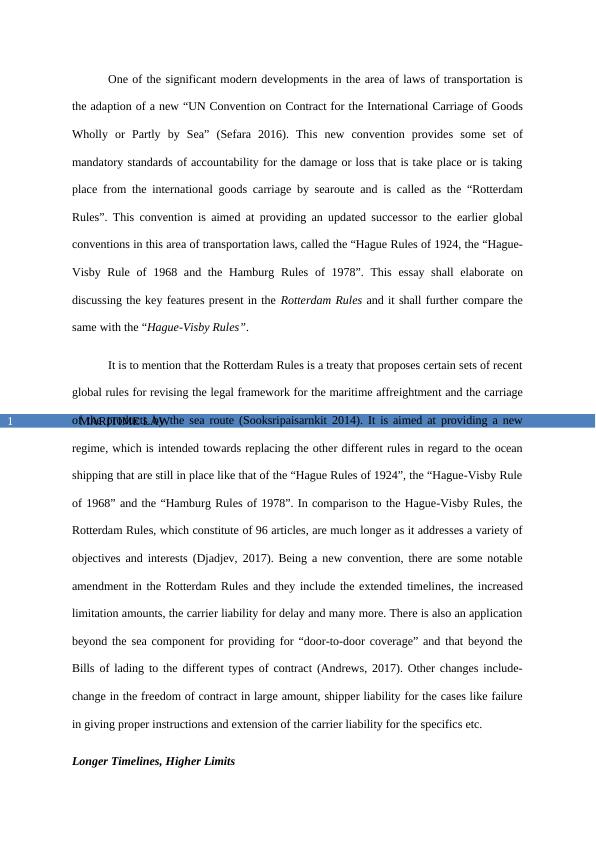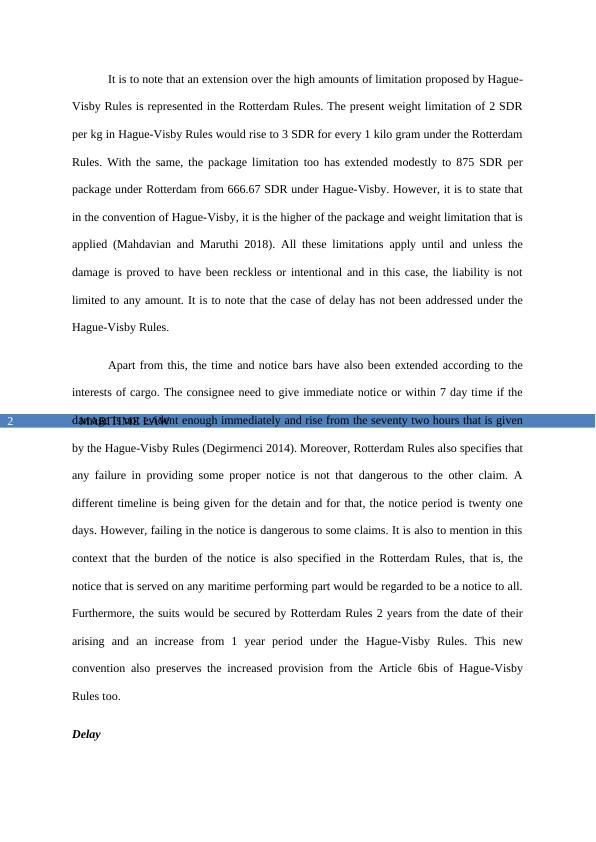Rotterdam Rules | Maritime Law
Added on 2022-08-31
8 Pages2495 Words20 Views
Running head: MARITIME LAW
MARITIME LAW
Name of the Student:
Name of the University:
Author note:
MARITIME LAW
Name of the Student:
Name of the University:
Author note:

MARITIME LAW1
One of the significant modern developments in the area of laws of transportation is
the adaption of a new “UN Convention on Contract for the International Carriage of Goods
Wholly or Partly by Sea” (Sefara 2016). This new convention provides some set of
mandatory standards of accountability for the damage or loss that is take place or is taking
place from the international goods carriage by searoute and is called as the “Rotterdam
Rules”. This convention is aimed at providing an updated successor to the earlier global
conventions in this area of transportation laws, called the “Hague Rules of 1924, the “Hague-
Visby Rule of 1968 and the Hamburg Rules of 1978”. This essay shall elaborate on
discussing the key features present in the Rotterdam Rules and it shall further compare the
same with the “Hague-Visby Rules”.
It is to mention that the Rotterdam Rules is a treaty that proposes certain sets of recent
global rules for revising the legal framework for the maritime affreightment and the carriage
of the products by the sea route (Sooksripaisarnkit 2014). It is aimed at providing a new
regime, which is intended towards replacing the other different rules in regard to the ocean
shipping that are still in place like that of the “Hague Rules of 1924”, the “Hague-Visby Rule
of 1968” and the “Hamburg Rules of 1978”. In comparison to the Hague-Visby Rules, the
Rotterdam Rules, which constitute of 96 articles, are much longer as it addresses a variety of
objectives and interests (Djadjev, 2017). Being a new convention, there are some notable
amendment in the Rotterdam Rules and they include the extended timelines, the increased
limitation amounts, the carrier liability for delay and many more. There is also an application
beyond the sea component for providing for “door-to-door coverage” and that beyond the
Bills of lading to the different types of contract (Andrews, 2017). Other changes include-
change in the freedom of contract in large amount, shipper liability for the cases like failure
in giving proper instructions and extension of the carrier liability for the specifics etc.
Longer Timelines, Higher Limits
One of the significant modern developments in the area of laws of transportation is
the adaption of a new “UN Convention on Contract for the International Carriage of Goods
Wholly or Partly by Sea” (Sefara 2016). This new convention provides some set of
mandatory standards of accountability for the damage or loss that is take place or is taking
place from the international goods carriage by searoute and is called as the “Rotterdam
Rules”. This convention is aimed at providing an updated successor to the earlier global
conventions in this area of transportation laws, called the “Hague Rules of 1924, the “Hague-
Visby Rule of 1968 and the Hamburg Rules of 1978”. This essay shall elaborate on
discussing the key features present in the Rotterdam Rules and it shall further compare the
same with the “Hague-Visby Rules”.
It is to mention that the Rotterdam Rules is a treaty that proposes certain sets of recent
global rules for revising the legal framework for the maritime affreightment and the carriage
of the products by the sea route (Sooksripaisarnkit 2014). It is aimed at providing a new
regime, which is intended towards replacing the other different rules in regard to the ocean
shipping that are still in place like that of the “Hague Rules of 1924”, the “Hague-Visby Rule
of 1968” and the “Hamburg Rules of 1978”. In comparison to the Hague-Visby Rules, the
Rotterdam Rules, which constitute of 96 articles, are much longer as it addresses a variety of
objectives and interests (Djadjev, 2017). Being a new convention, there are some notable
amendment in the Rotterdam Rules and they include the extended timelines, the increased
limitation amounts, the carrier liability for delay and many more. There is also an application
beyond the sea component for providing for “door-to-door coverage” and that beyond the
Bills of lading to the different types of contract (Andrews, 2017). Other changes include-
change in the freedom of contract in large amount, shipper liability for the cases like failure
in giving proper instructions and extension of the carrier liability for the specifics etc.
Longer Timelines, Higher Limits

MARITIME LAW2
It is to note that an extension over the high amounts of limitation proposed by Hague-
Visby Rules is represented in the Rotterdam Rules. The present weight limitation of 2 SDR
per kg in Hague-Visby Rules would rise to 3 SDR for every 1 kilo gram under the Rotterdam
Rules. With the same, the package limitation too has extended modestly to 875 SDR per
package under Rotterdam from 666.67 SDR under Hague-Visby. However, it is to state that
in the convention of Hague-Visby, it is the higher of the package and weight limitation that is
applied (Mahdavian and Maruthi 2018). All these limitations apply until and unless the
damage is proved to have been reckless or intentional and in this case, the liability is not
limited to any amount. It is to note that the case of delay has not been addressed under the
Hague-Visby Rules.
Apart from this, the time and notice bars have also been extended according to the
interests of cargo. The consignee need to give immediate notice or within 7 day time if the
damage is not evident enough immediately and rise from the seventy two hours that is given
by the Hague-Visby Rules (Degirmenci 2014). Moreover, Rotterdam Rules also specifies that
any failure in providing some proper notice is not that dangerous to the other claim. A
different timeline is being given for the detain and for that, the notice period is twenty one
days. However, failing in the notice is dangerous to some claims. It is also to mention in this
context that the burden of the notice is also specified in the Rotterdam Rules, that is, the
notice that is served on any maritime performing part would be regarded to be a notice to all.
Furthermore, the suits would be secured by Rotterdam Rules 2 years from the date of their
arising and an increase from 1 year period under the Hague-Visby Rules. This new
convention also preserves the increased provision from the Article 6bis of Hague-Visby
Rules too.
Delay
It is to note that an extension over the high amounts of limitation proposed by Hague-
Visby Rules is represented in the Rotterdam Rules. The present weight limitation of 2 SDR
per kg in Hague-Visby Rules would rise to 3 SDR for every 1 kilo gram under the Rotterdam
Rules. With the same, the package limitation too has extended modestly to 875 SDR per
package under Rotterdam from 666.67 SDR under Hague-Visby. However, it is to state that
in the convention of Hague-Visby, it is the higher of the package and weight limitation that is
applied (Mahdavian and Maruthi 2018). All these limitations apply until and unless the
damage is proved to have been reckless or intentional and in this case, the liability is not
limited to any amount. It is to note that the case of delay has not been addressed under the
Hague-Visby Rules.
Apart from this, the time and notice bars have also been extended according to the
interests of cargo. The consignee need to give immediate notice or within 7 day time if the
damage is not evident enough immediately and rise from the seventy two hours that is given
by the Hague-Visby Rules (Degirmenci 2014). Moreover, Rotterdam Rules also specifies that
any failure in providing some proper notice is not that dangerous to the other claim. A
different timeline is being given for the detain and for that, the notice period is twenty one
days. However, failing in the notice is dangerous to some claims. It is also to mention in this
context that the burden of the notice is also specified in the Rotterdam Rules, that is, the
notice that is served on any maritime performing part would be regarded to be a notice to all.
Furthermore, the suits would be secured by Rotterdam Rules 2 years from the date of their
arising and an increase from 1 year period under the Hague-Visby Rules. This new
convention also preserves the increased provision from the Article 6bis of Hague-Visby
Rules too.
Delay

End of preview
Want to access all the pages? Upload your documents or become a member.
Related Documents
ASSIGNMENT ON LANDMARK DEVELOPMENT IN MARITIME LAWlg...
|11
|2774
|30
Export International trade law PDFlg...
|16
|6278
|149
International Trade Regulation and Practicelg...
|10
|2498
|20
International Business Lawlg...
|6
|1541
|85
